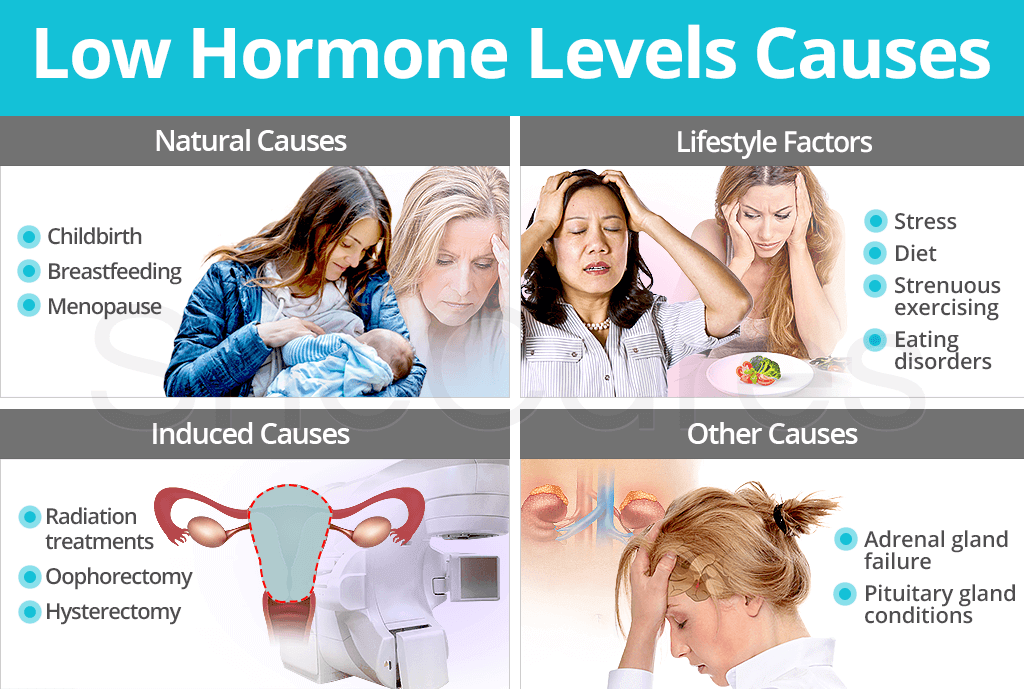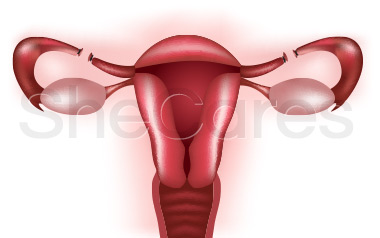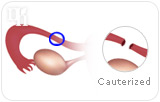In order to embark on the path to hormonal health, it is important women take note of what threw them out of equilibrium to begin with. From natural causes to lifestyle factors to induced causes and others, there are many worth contemplating. Discover more about the reasons for low hormone levels in women below.
Natural Causes of Low Hormone Levels
During Adulthood
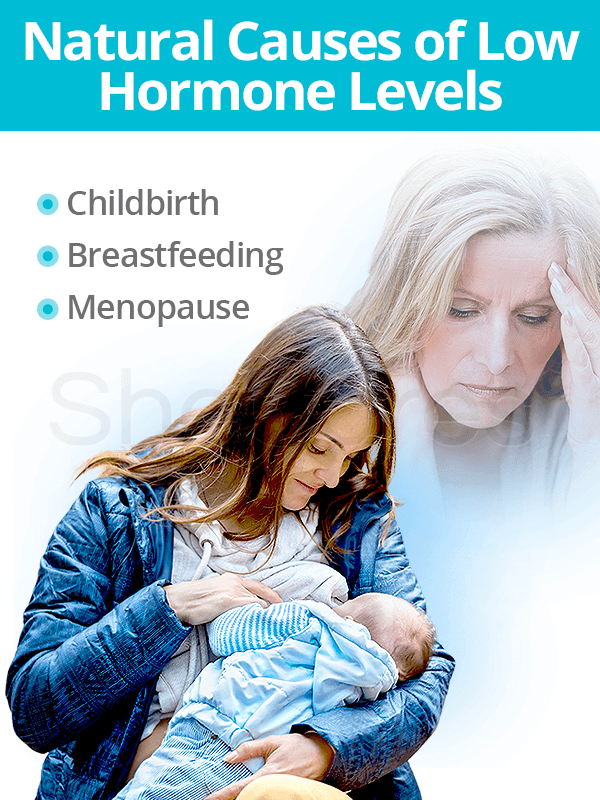
Natural dips in hormone levels occur when a woman is giving birth or breastfeeding.
Throughout pregnancy, hormones - such as progesterone and estrogen - are instrumentally higher than normal to support fetal development during the nine months of being pregnant.
Then, with childbirth, pregnancy hormone levels decrease steeply to allow for breast milk production for if a woman would like to breastfeed.
Breastfeeding presents a time of low hormone levels in the absence of menstruation as well as ovulation. Logically, if a woman is not having her menstrual cycle, she is not ovulating.
During Perimenopause and After Menopause (40s on up)
The menopausal transition also presents a time of low hormone levels as a woman's ovarian reserve begins to run dry, and her reproductive functions begin to wind down for the rest of her life.
During the years leading up to menopause, also known as perimenopause, key hormones will be fluctuating until they reach a consistent low with postmenopause.
Lifestyle Factors that Cause Low Hormone Levels
Other than natural causes of low hormone levels, there are certain lifestyle influences that can provoke them as well, including:
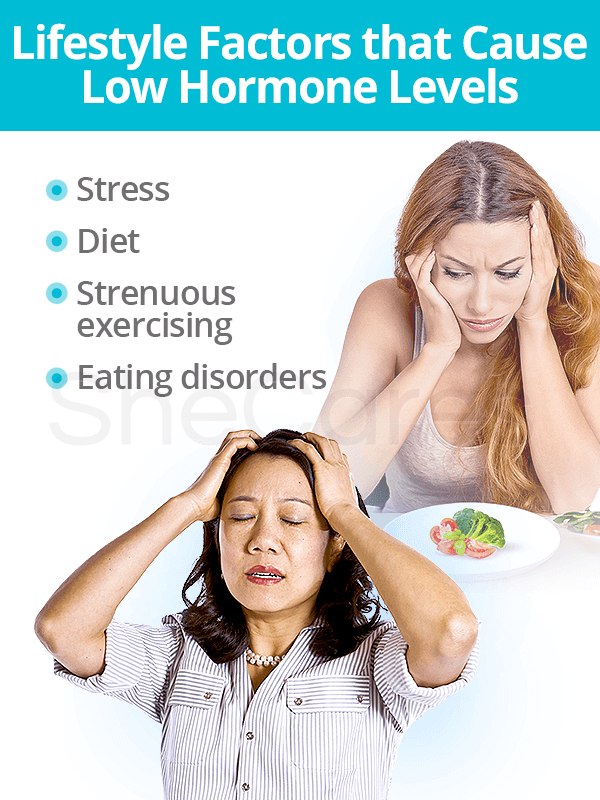
Stress. Studies have found that high stress levels can lower reproductive hormones, such as estrogen and progesterone.1 Stress has also been found to disrupt hypothalamic function, which can lead to future physical and mental health conditions, including chronic fatigue, depression, immune disorders, and more.
Strenuous exercising. Secondary amenorrhea can be caused by over-exercising or by increasing the intensity of exercise rapidly. Menstrual disorders like this can disrupt female reproductive system functions and - thus - cause low hormone levels.
Diet. Diet can affect hormone levels in various ways. For instance, sufficient iodine intake is necessary for healthy thyroid function. Also, a low-fat diet has been found to reduce blood estrogen levels by 15 percent.2
Eating disorders. Anorexia or extreme dieting have been named as common causes of low estrogen levels, specifically estrogen. Eating disorders can also lead to low thyroid hormones.
Induced Causes of Low Hormone Levels
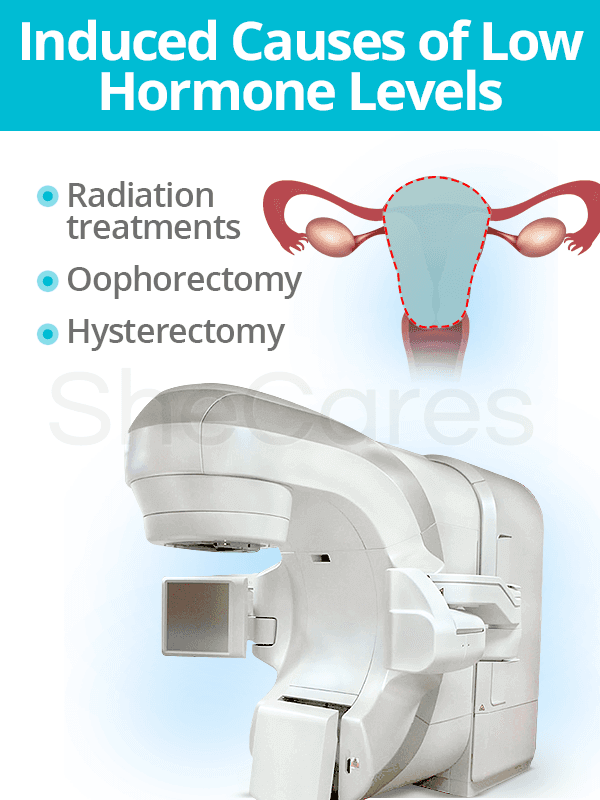
There are numerous procedures and treatments that can be reason for low hormone levels in women, such as radiation therapy, medications, or chemotherapy.
Radioactive iodine taken to cure hyperthyroidism can damage the thyroid gland, thus provoking permanent hypothyroidism and low thyroid hormones.
Radiation treatments for cancer, lymphoma, and Hodgkin's disease may also damage the gland in addition to the pituitary gland, another key hormone producer.
Furthermore, research has found that women who undergo a bilateral oophorectomy - surgical removal of both ovaries - before natural menopause will suffer from low estrogen and progesterone levels as well as a marked decrease in testosterone levels.3
Likewise, a drop of estrogen and progesterone levels often happens within a few years of the surgical removal of the uterus, a hysterectomy, before menopause as well. This may or may not be due to the surgery itself or the condition leading to the hysterectomy.4
Other Causes of Low Hormone Levels
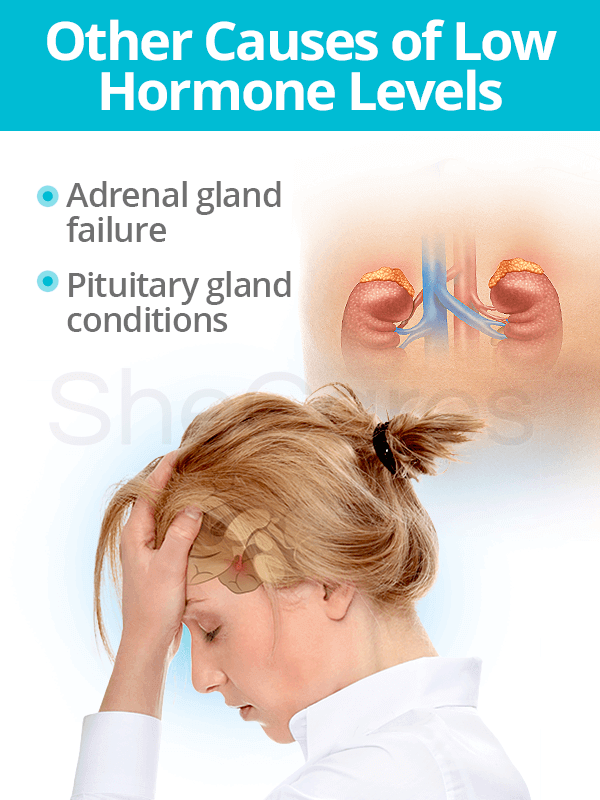
Further causes of low hormone levels can include the following:
Adrenal gland failure. An autoimmune disease or damage to the adrenal glands can disrupt production of cortisol and aldosterone, provoking adrenal insufficiency.
Pituitary gland conditions. Tumors, inflammation, or even surgery of the pituitary gland can cause it not to produce enough of its own hormones.
In summary, what causes low hormone levels in females can range from natural causes to lifestyle factors to induced reasons, and more.
If you suspect low hormone levels to be at fault for you feeling down, check out low hormone levels symptoms. Take your hormonal health into your hands today for a better tomorrow!
Sources
- American Psychological Association. (n.d.). Stress effects on the body. Retrieved December 2, 2019, from https://www.apa.org/helpcenter/stress-body
- Fisher, E. (2015). Understanding Your Fertility while Breastfeeding. Retrieved November 25, 2019, from https://breastfeedingusa.org/content/article/understanding-your-fertility-while-breastfeeding
- Harvard Health Publishing. (2019). Amenorrhea | The lowdown on thyroid slowdown. Retrieved December 2, 2019, from https://www.health.harvard.edu/a_to_z/amenorrhea-a-to-z | https://www.health.harvard.edu/diseases-and-conditions/the-lowdown-on-thyroid-slowdown
- Healthy Women. (n.d.). Could You Have Low Estrogen? Retrieved December 2, 2019, from https://forevher.healthywomen.org/overview-diagnosis/could-you-have-low-estrogen/
- Mayo Clinic. (2019). Addison's disease: Symptoms & causes | Amenorrhea: Symptoms & causes. Retrieved November 25, 2019, from https://www.mayoclinic.org/diseases-conditions/addisons-disease/symptoms-causes/syc-20350293 | https://www.mayoclinic.org/diseases-conditions/amenorrhea/symptoms-causes/syc-20369299
- Memorial Care. (2018). These Are the Causes of Hormonal Imbalance & How to Treat Them. Retrieved November 25, 2019, from https://www.memorialcare.org/about/pressroom/media/these-are-causes-hormonal-imbalance-how-treat-them-2018-06-22
- NHS. (2019). Considerations: Hysterectomy. Retrieved December 2, 2019, from https://www.nhs.uk/conditions/hysterectomy/considerations/
- Society for Endocrinology. (2016). Eating disorders and hormones. Retrieved December 2, 2019, from https://www.yourhormones.info/topical-issues/eating-disorders-and-hormones/
- World Health Organization. (2009). Infant and Young Child Feeding: The physiological basis of breastfeeding. Retrieved November 25, 2019, from https://www.ncbi.nlm.nih.gov/books/NBK148970/
Footnotes:
- Roney, J.R. & Simmons, Z.L. (2014). Elevated Psychological Stress Predicts Reduced Estradiol Concentrations in Young Women. Adaptive Human Behavior and Physiology, 1(1), 30-40. Retrieved November 25, 2019, from https://link.springer.com/article/10.1007%2Fs40750-014-0004-2
- Women's Health Initiative. (2006). Low-Fat Dietary Pattern and Risk of Breast Cancer, Colorectal Cancer, and Cardiovascular Disease: The Women's Health Initiative (WHI) Randomized Controlled Dietary Modification Trial. Retrieved December 2, 2019, from https://www.whi.org/participants/findings/Pages/dm_cancercvd.aspx
- Rocca, W.A. et al. (2009). Long-term effects of bilateral oophorectomy on brain aging: Unanswered questions from the Mayo Clinic Cohort Study of Oophorectomy and Aging. Women's Health (London, England), 5(1), 39-48. doi: 10.2217/17455057.5.1.39
- Moorman, P.G. et al. (2011). Effect of Hysterectomy With Ovarian Preservation on Ovarian Function. Obstetrics & Gynecology, 118(6), 1271-1279. doi: 10.1097/AOG.0b013e318236fd12
